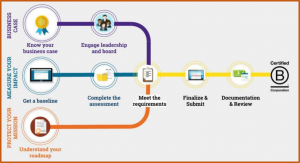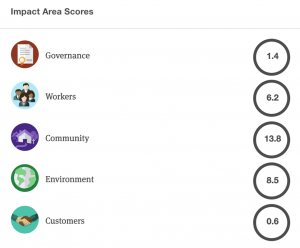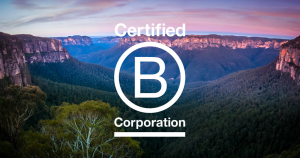
For my capstone project, I worked with a team to help a local small business achieve its B Corp certification. The focus of this project was on Condor chocolate, a coffee and confections company, owned by Athens serial entrepreneur Peter Dale. Our team was made up of three students from the sustainability program, two MBA students, the director of student services, and the director of B Local GA. Overall, the opportunity to work with such a unique team and partner with a local company to bring forth positive change in their business model made this one of the most influential and educational experience of my undergraduate career.
Background:
Certified B Corporations are a new kind of business that strike a balance between people, planet, and profit. This certification is unique in that it creates a global community of leaders that includes 3128 companies spread across 150 industries in 71 countries. These companies have been united under a single goal, to use business as a force for good. The process of becoming B Corp certified requires scoring 80 out of a possible 200 points on an impact assessment that measures the company’s impact on their governance, workers, community, environment, and customers. Once the assessment is completed and passed, they are audited to ensure their documentation is accurate before finally becoming certified and joining the tight-knit B Corp community.

Project Description:
The goal of our project was to assist Condor chocolate in the completion of the assessment, understand and assess the status quo of the assessment, and identify areas to improve their score. Because achieving certification can be a long-term process, our intent was to hand over our progress to another capstone team with the hope that they can complete the project in the fall.
The first part of our semester was centered around helping Peter to complete the B impact assessment. This process was much more time consuming than it may sound because the assessment includes hundreds of questions that analyze every aspect of a business. Many of the questions were easily answered, however, others required a deeper look at Condor’s financials, supply chain, and other quantifiable metrics. The assessment is split into five sections including governance, workers, community, environment, and customers. As a result, we tackled the sections one at a time with Peter going through and answering what he could and then our team following behind to determine ways we could score more points. This process continued until we completed the majority of the assessment and reached a status quo score for Condor of 30.7 points.
Step two of this project entailed establishing areas of improvement to boost Condor’s score as high as possible with the hope that we could reach the necessary 80 points. Despite a 50 out of 200-point increase not seeming too difficult, it became a huge challenge because most of the questions were worth fractions of a point. Therefore, we had to adapt and prioritize areas to make the most effective use of our time. One of the techniques that we used in this process was identifying “low-hanging fruit”. This meant that we would break down sections of the assessment to find questions where we could easily get points through making policy changes and introducing documentation to the Condor handbook. We drafted documents such as a mission statement, code of ethics, supplier diversity and conduct plan, bonus/profit-sharing plan, and diversity and inclusion plan. However, we still struggled to score points in many of the sections. Luckily, the B Corp community is an extremely collaborative network so we were able to employ the help of certified companies such as New Belgium Brewing, Ad Victoriam Solutions, and Creature Comfort Brewing to gain new perspectives on ways to improve our score.

Unfortunately, as we were approaching the end of the assessment, the Covid-19 crisis put a halt on Peter’s involvement in our project and left our team to finish the work remotely. This meant that the remainder of the questions on the assessment were completed under the assumption that Peter would implement the changes we were making when he had the time. In addition, we had to come to terms with the fact that achieving certification for Condor Chocolates would be an ongoing process that would have to be put on hold until the security of Peter’s five businesses was assured. Despite these challenges, our team was still able to create an implementation plan with an array of positive suggestions for Peter that would help him improve his baseline score drastically. In addition, we compiled a one drive folder to present to him that contained new documentation for his handbook, employee surveys, supplier surveys, and a variety of other resources for him to use going forward.
Resources and Partners:
The progress that we made for Condor Chocolate on their path to certification would not have been possible without the guidance, input, and mentorship of a few people. Jake Mosley, the Director of Student Services at UGA, was extremely influential in this project. He constantly made himself available for any questions we had and used his experience working with other capstone groups to provide us with resources. Sarah Fraser, the sustainability specialist at New Belgium Brewing Company, helped our team understand the scientific language used in questions in the environmental section and gave us unique ideas on how to maximize our score. Finally, Nathan Stuck, the Director of Corporate Culture at Ad Victoriam Solutions, used his vast knowledge and experience of the B Corp certification process and B Local movement to help our team every step of the way.
Conclusion:
Although the final product of this capstone did not turn out the way I expected, my involvement in this project had a huge influence on my sustainability learning. I had some knowledge of B Corps before working on this capstone which was why I was so interested in being a part of this team. However, I learned more about what sustainable business entails and how big of a difference they can make in the world than I ever thought possible. Having the opportunity to deeply analyze the impact that a small business like Condor Chocolates has on social, environmental, and economic issues was eye-opening. Overall, this experience solidified for me that this is the future of doing business and I am now confident that I want to use business as a force for good going forward in my life.

